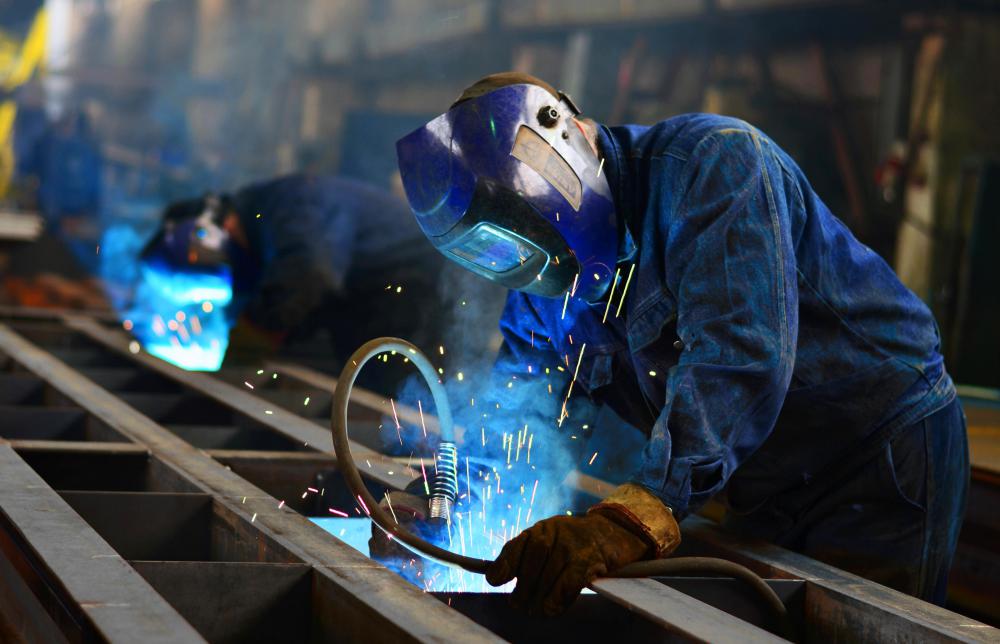At WiseGEEK, we're committed to delivering accurate, trustworthy information. Our expert-authored content is rigorously fact-checked and sourced from credible authorities. Discover how we uphold the highest standards in providing you with reliable knowledge.
What does a Manufacturing Engineer do?
A manufacturing engineer is an industrial production expert who researches and develops methods of designing, building, and shipping various items. He or she determines the best ways of utilizing industrial machinery and assembly line workers to maximize efficiency. Manufacturing engineers decide when new machinery or policies are needed, and actively coordinate with management to ensure plans are carried out in a quick and economical manner.
Many industries rely on the expertise of knowledgeable manufacturing engineers to keep costs down and increase profits. Professionals aid in the production of prefabricated building materials, consumer electronics, furniture, automobiles, and packaged food, among hundreds of other specialty items. Regardless of the specific industry, a manufacturing engineer performs extensive research on existing technology and production techniques. He or she often determines the most appropriate equipment to build or purchase and decides how to efficiently situate machine stations on the factory floor.

In addition to increasing the efficiency of production techniques, a manufacturing engineer also focuses on improving worker safety and satisfaction. He or she may write training manuals, develop new worker classes, and perform regular facility tours and personal performance reviews to determine the effectiveness of company polices. The engineer also creates and enforces safety rules to keep workplace accidents and equipment malfunctions at a minimum. A professional understands how important a well-prepared, motivated workforce is to the overall success of a company.

Manufacturing engineers are generally very organized and detail-oriented people. The job requires expert math, physics, and computer skills to design schematics for new processes and systems. Communication skills are also important, as a manufacturing engineer must describe his or her recommendations to executives and explain new procedures to floor workers. In addition, engineers in many industries employ their knowledge of marketing and general business management to determine specific types and quantities of goods to produce in order to maximize profit versus cost margins.

A person who wants to become a manufacturing engineer usually needs to obtain at least a bachelor's degree from an accredited university. Many schools offer manufacturing engineering majors, and colleges without the specific major usually provide much of the same instruction in industrial or mechanical engineering programs. With a degree, an individual can begin applying for entry-level junior engineer positions. New workers typically receive formal on-the-job training and operate under the supervision of experienced engineers for several months. Some positions within the realm of manufacturing engineering require new professionals to pass licensing exams before they can begin working independently.
AS FEATURED ON:
AS FEATURED ON:

















Discussion Comments
@SkyWhisperer - Well if you’re good as a manufacturing engineer then I believe that you would be even more in demand.
Think about it, what’s the best way to improve your bottom line in a tight economy? Improve existing processes. That’s what these engineers do. If they do it, they make those plants that are here more profitable. So I say it depends on how effective you are at what you do.
@miriam98 - I wonder about the outlook for manufacturing engineering jobs, considering the fact the manufacturing base in the United States has largely fled overseas.
I realize that there are still companies that make stuff here, but do you really think this would be a worthwhile profession to pursue? If I were going into engineering of any sort, I might consider another branch of the discipline, not one related to manufacturing plants.
@David09 - Yeah, that’s just the mindset of the engineer. But not all mechanical engineers build stuff (at least not all the time).
As the article points out they focus on improving existing production methods. I’m sure there are practical methods for doing this, but I personally think that they can learn a lot from how the Japanese do their assembly line work.
The Japanese have a philosophy called “Kaizen” which means continual improvement. I read about it once in a management course. I don’t know all the details of how it works but they basically keep looking for ways to refine their manufacturing methods and improve the efficiency of their processes.
Perhaps American companies use this as well, I don’t know; but I think this would be the most important part of the manufacturing engineer job description.
Some people have a knack for being able to look at a mechanical contraption and intuitively understanding how it works. My friend is an engineer, and when we moved to a new house he offered to help us move.
We ran into a problem of trying to get our big stainless steel refrigerator through the door of the house. We removed the door, which was the easy part of the job.
However, the refrigerator itself had handles that were attached to its own doors. Those handles kept the unit from moving through.
The handles had to be removed. My engineer friend figured out not only how to disassemble the door handles, with their various tiny parts, but also how to assemble them back together again.
I had no idea how to do that. All I saw was a mess of springs and metal pieces. As an engineer, though, he understood it perfectly.
Post your comments